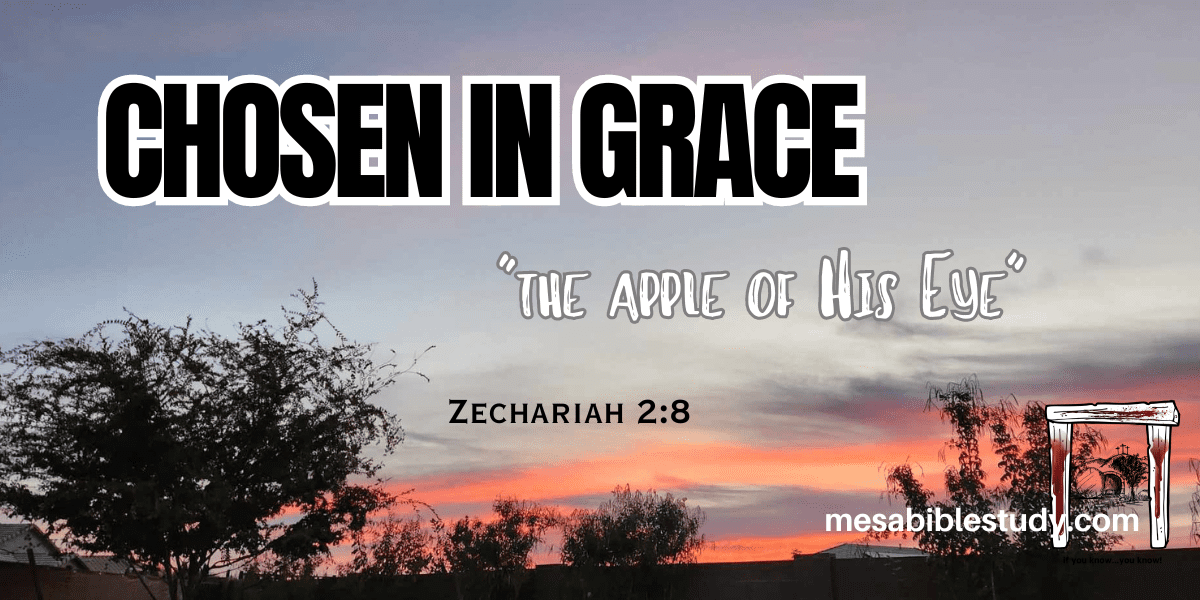Verse of the Day: Zechariah 2:8
For thus saith the LORD of hosts; After the glory hath he sent me unto the nations which spoiled you: for he that toucheth you toucheth the apple of his eye.
In today’s devotional, we’ll delve into Zechariah 2:8 and explore how this Old Testament passage, directed to Israel, holds a far-reaching message for believers in the age of grace. While God’s covenant promises to Abraham, Isaac, and Jacob were specific to the nation of Israel (and still are), we, as members of the body of Christ, can find encouragement and deeper understanding in this verse.
1. Chosen in Grace
In Zechariah 2:8, God speaks to His chosen people, Israel, addressing them as the “apple of His eye.” Consider the tenderness of this analogy. The Lord describes His people as the “apple of His eye,” highlighting their preciousness. Like the eye, which is delicate and vital, God’s chosen ones (Israel under covenants and the Church under grace) hold a special place in His heart. Harming them is akin to touching the very core of God’s heart.
As believers living in the age of grace, we must recognize that God’s love for His chosen people has not diminished. However, there is an essential distinction between Israel and the Church. While Israel has its unique and special place in God’s plan, grace-age believers are also chosen. Ephesians 1:4 tells us, “According as he hath chosen us in him before the foundation of the world, that we should be holy and without blame before him in love.” We, too, are chosen by God, not based on lineage or ethnicity but by His grace. Amen!
2. The Church: The Body of Christ
God’s message to Israel in Zechariah 2:8 emphasizes their significance and protection under covenants (promises) God made to Israel, but in the age of grace, believers, as the Church, are part of the body of Christ. In 1 Corinthians 12:27, we read, “Now ye are the body of Christ and members in particular.” Just as Israel was set apart in the Old Testament, we (both Jews and Gentiles) are set apart as members of the Church (the body of Christ), connected to Christ as the head of the body.
3. Law vs. Grace
Zechariah 2:8 reflects the covenant promises made to Israel, beginning with the Abrahamic covenant in Genesis 12:3. However, we, as grace-age believers, are not under the same covenant. We are under the age of grace, that is, salvation is for both Jew and Gentile by grace through faith in the finished work of the cross alone, apart from the Mosaic law, temple worship, or any ritual or works (1 Corinthians 15:1-4; Romans 3:21). This distinction between the law and grace is vital for us to understand, as it sets the foundation for our faith today.
4. The Unchanging Love of God
While the application of Zechariah 2:8 differs between Israel and the Church, one constant remains: the unchanging love of God. In both cases, God’s love for those who love Him endures. Romans 8:38–39 beautifully reaffirms this truth: “For I am persuaded that neither death nor life, nor angels nor principalities nor powers, nor things present nor things to come, nor height nor depth, nor any other creature, shall be able to separate us from the love of God, which is in Christ Jesus our Lord.”
As we reflect on Zechariah 2:8, let us be encouraged by the fact that we, as believers in this age of grace, are also chosen by God by His grace. We are part of the body of Christ, recipients of His grace, and heirs to the promise of eternal life. Let us embrace this distinction between Israel and the Church, understanding our unique place in God’s plan, and may we continue to rest in the unchanging love of our heavenly Father.

0 Comments